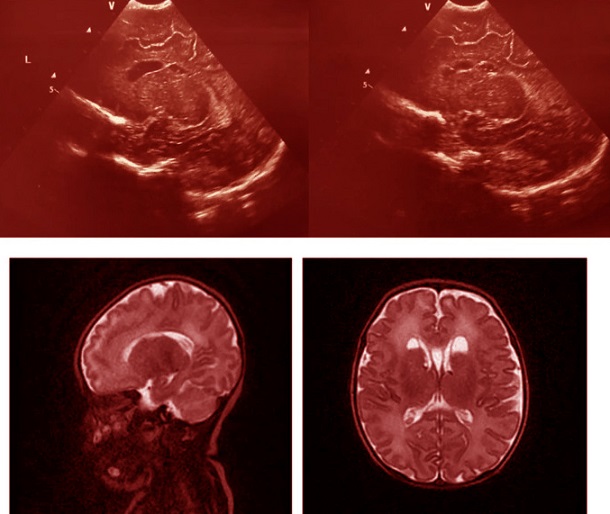Italian Study Highlights Increased Intracranial Abnormalities in Newborns Exposed to SARS-CoV-2
Nikhil Prasad Fact checked by:Thailand Medical News Team Dec 06, 2024 5 months, 3 days, 7 hours, 17 minutes ago
Medical News: A groundbreaking study conducted at San Marco University Hospital in Catania, Sicily, Italy, has revealed new insights into the potential impacts of SARS-CoV-2 on newborns. Researchers from this hospital and the University of Ferrara carried out an ultrasonographic analysis on newborns exposed to the virus, highlighting a significant incidence of minor intracranial abnormalities compared to unexposed infants. The findings raise important questions about the long-term neurological implications for children born during the COVID-19 pandemic.
 Italian Study Highlights Increased Intracranial Abnormalities in Newborns Exposed to SARS-CoV-2
The Study at a Glance
Italian Study Highlights Increased Intracranial Abnormalities in Newborns Exposed to SARS-CoV-2
The Study at a Glance
This
Medical News report delves into the research conducted by Bruna Scalia, Marco Andrea Nicola Saporito, and their colleagues, investigating cranial ultrasonography (cUS) findings in infants born to mothers who tested positive for SARS-CoV-2 during pregnancy or at delivery. The team analyzed data from 278 newborns, evenly split between exposed and unexposed cohorts. The study adhered to stringent observational protocols to ensure the reliability of results.
Key Findings
Among the 139 newborns exposed to SARS-CoV-2, 23% exhibited intracranial abnormalities on cUS, compared to 16.5% in the unexposed group. Minor abnormalities were most prevalent and included subependymal cysts (SEPCs), choroid plexus cysts (CPCs), frontal horn cysts (FHCs), and lenticulostriate vasculopathy (LV). Major abnormalities, such as cerebellar hemorrhages and arachnoid cysts, were rare but noteworthy.
Interestingly, infants exposed to SARS-CoV-2 during pregnancy had a higher rate of abnormalities (38.4%) than those exposed at birth (19.5%). The second trimester emerged as a particularly critical period, with the majority of abnormalities observed in this subgroup.
Why These Findings Matter
The study's results are alarming for public health professionals and expectant mothers. While SARS-CoV-2's immediate risks to newborns have been considered minimal, this research suggests subtle yet significant neurological effects. These abnormalities, although classified as minor, may carry long-term implications for cognitive and behavioral development.
The link between maternal inflammation and fetal development is not new, but the cytokine storm induced by SARS-CoV-2 appears to heighten this risk. The researchers hypothesize that inflammatory markers like interleukin-6 could cross the placenta, affecting the fetal brain and potentially disrupting synaptogenesis.
Methodology Details
All newborns in the study underwent cranial ultrasonography within their first week of life. The scans were conducted using standardized equipment by experienced neonatologists. The findings were categorized as normal, minor, or major abnormalities. To exclude confounding factors, the study excluded infants with other infections or genetic disorders.
Demographic factors, such as gestational age and birth weight, were comparable across both groups. However, premature birth and maternal complications, such as gestational diabetes and hypertension, were noted as potential contributors to the observed abnormalities.
Implications for Future Research
The findings call for more extensive, longitudinal studies to understand the long-term effects of these abnormalities. Current evidence suggests a potential association between minor abnormalities like SEPCs and neuropsychiatric conditions such as autism and ADHD. Further investigation could clarify whether these cUS findings are precursors to such outcomes.
What Experts Are Saying
The study's authors emphasize caution, noting that minor intracranial abnormalities do not necessarily predict adverse outcomes. However, they recommend routine cranial ultrasonography for newborns exposed to SARS-CoV-2 as a precautionary measure. "The cost-effectiveness and non-invasive nature of cUS make it a valuable tool in monitoring these infants," said lead researcher Bruna Scalia.
Limitations and Strengths of the Study
One limitation of the study was its relatively small sample size, particularly for subgroups like prenatally exposed infants. Additionally, the lack of serological testing for unexposed mothers could have introduced undetected cases into the control group. However, the study's rigorous methodology and use of a well-matched control group lend credibility to its conclusions.
Study Conclusions
The research underscores a statistically significant increase in minor intracranial abnormalities among SARS-CoV-2-exposed newborns. These findings are particularly pronounced in infants exposed during the second trimester of pregnancy. While the abnormalities observed in the study were predominantly minor, their potential impact on long-term neurological outcomes cannot be overlooked. The researchers advocate for the following:
-Routine cUS Screening: Cranial ultrasonography should be performed on all newborns exposed to SARS-CoV-2 to identify abnormalities early.
-Long-Term Follow-Up: Exposed infants should be enrolled in neurodevelopmental follow-up programs to monitor their progress and intervene if necessary.
-Expanded Research: Larger, multicenter studies are needed to confirm these findings and explore the mechanisms behind SARS-CoV-2's impact on fetal brain development.
By highlighting these abnormalities, the study adds a critical layer to our understanding of COVID-19's broader implications, particularly for future generations.
The study findings were published in the peer-reviewed Italian Journal of Pediatrics.
https://link.springer.com/article/10.1186/s13052-024-01826-3
For the latest COVID-19 News, keep on logging to Thailand
Medical News.
Read Also:
https://www.thailandmedical.news/news/covid-19-during-pregnancy-linked-to-rise-in-congenital-heart-disease-in-newborns
https://www.thailandmedical.news/news/breaking-pediatricians-warn-that-covid-19-can-cause-gastric-perforations-in-new-borns
https://www.thailandmedical.news/news/breaking-children-whose-mothers-were-infected-with-covid-19-during-pregnancy-likely-to-suffer-from-neurodevelopmental-delays
https://www.thailandmedical.news/news/covid-19-news-study-shows-that-exposure-to-sars-cov-2-during-pregnancy-results-in-newborns-developing-epigenetic-changes
https://www.thailandmedical.news/news/study-shows-disruptions-in-lipid-metabolism-in-covid-19-infections-during-pregnancy-will-affect-newborn-health
https://www.thailandmedical.news/news/breaking-news-offspring-of-pregnant-women-with-covid-19-will-likely-have-altered-brain-developments-especially-males
https://www.thailandmedical.news/news/breaking-news-covid-19-exposure-during-pregnancy-leads-to-epigenetic-changes-in-newborns,-paving-the-way-for-health-issues-later-in-life
https://www.thailandmedical.news/news/covid-19-news-harvard-study-finds-that-babies-born-to-mothers-exposed-to-sars-cov-2-likely-to-develop-neurodevelopmental-disorders
